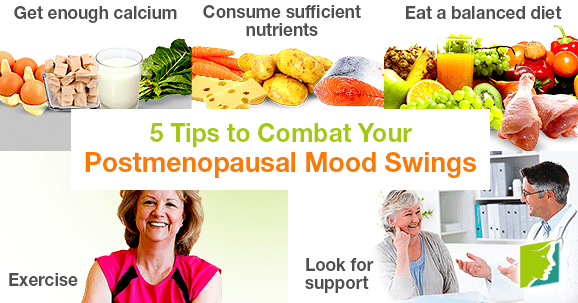Although many symptoms such as hot flashes, mood swings, and vaginal dryness are commonly associated with menopause, these symptoms do not always subside as a woman enters postmenopause.
Treating Mood Swings
If you are looking for a way to reduce mood swings, try following some of the following lifestyle tips.
Get enough calcium
Getting the right nutrients is imperative to both physical and mental health. Calcium is necessary for overall health, but many people do not get enough of it. This can lead to health problems. Calcium is found in dairy products, soy products, dark leafy greens, and is fortified in some foods.
Eat nutrients that support emotional health
Research has shown that not getting enough vitamin B6, L-tryptophan, and magnesium can cause mood swings because all of these nutrients play a vital role in the brain chemistry that controls emotions.
L-tryptophan is an amino acid that helps make the chemical serotonin, which is the neurotransmitter that controls mood. It is found in most foods that contain protein. Vitamin B6 also helps produce neurotransmitters that control mood. It is found in:
- Beans and lentils
- Carrots, spinach, and peas
- Potatoes, flour and whole grains
- Milk and cheese
- Eggs
- Fish
- Meat, especially organ meat
Magnesium is necessary for the body's organs to function properly. Magnesium is found in:
- Tofu
- Legumes
- Whole grains
- Green leafy vegetables
- Nuts
If you are having trouble incorporating enough of these foods into your diet, it may be a good idea to talk to your doctor about taking supplements in order to get enough of the correct nutrients.
Eat a balanced diet
Incorporate foods from the five food groups into your daily diet. These are:
- Fruit
- Vegetables
- Meat, fish, and soy
- Milk and dairy products
- Whole grains and potatoes
Eating the right balance of nutrients will help keep you healthy physically and emotionally. It is also important to limit foods and drinks that contain alcohol or caffeine, as these substances can trigger or worsen mood swings.
Exercise
Not only does exercise help relieve stress, but it also elevates your mood by triggering the release of endorphins. Exercising will also help you sleep better at night and improve your overall health. Try taking a yoga or speed-walking class in order to incorporate more exercise into your life.
Get support
Mood swings can seriously impact your life and the lives of the people around you. Mood swings can also be symptoms of more serious medical conditions, such as anxiety or depression. Try opening up to a partner, friend, relative, or trusted community member. Seeing a therapist or counselor can also help you work through anything that may be causing the mood swings.
Recommendations
Mood swings can be the early symptoms of a more severe condition, such as anxiety or depression, so it is important to seek help if you feel like your mood swings are becoming overwhelming or controlling parts of your life. Click on the following link to read more about other ways to manage mood swings.
Sources
- Gallenberg, M.M. (2012). What's the difference between premenstrual dysphoric disorder and premenstrual syndrome? Retrieved October 13, 2015, from http://www.mayoclinic.org/diseases-conditions/premenstrual-syndrome/expert-answers/pmdd/faq-20058315
- Mayo Clinic Staff. (2013). Vitamin B6 (pyridoxine). Retrieved October 13, 2015, from http://www.mayoclinic.org/drugs-supplements/vitamin-b6/background/hrb-20058788
- University of Maryland Medical Center. (2015). Magnesium. Retrieved October 13, 2015, from https://umm.edu/health/medical/altmed/supplement/magnesium
- University of Michigan Health System. (2015). L-Tryptophan. Retrieved October 13, 2015, from http://www.uofmhealth.org/health-library/hn-10006312



